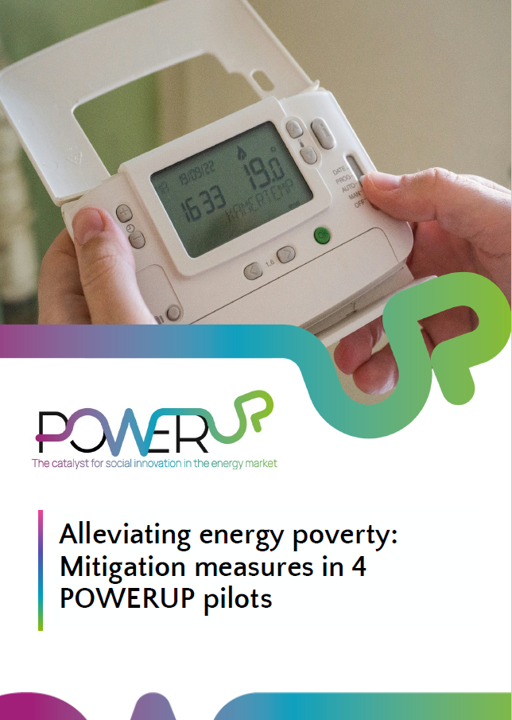Even though the energy crisis is not in the top news anymore, it remains a burning social issue across Europe. Solutions are being designed, but those affected rarely have a say. Since the start of POWER UP co-designing activities, a selected group of people struggling with energy poverty were actively involved in collective decisions around renewable energy production. But awareness-raising and support should not be limited to a few. That is why, over the past months, the four pilots of POWER UP engaged a broader group of residents in activities whereby they learned how to have control over their energy consumption.

A brand new report outlines the measures they have undertaken, especially informing about options to optimise energy use or to get supplied with renewable energy. It provides practical examples of how local actions can empower vulnerable populations, promote sustainability, and foster energy efficiency.
Local partnerships in the Italian pilots and Valencia, informal gatherings in Eeklo, and public events in Rožnov showcased diverse, accessible approaches to empowering vulnerable populations. These initiatives delivered immediate benefits, such as reduced costs and improved energy access, while building a foundation for sustainable and lasting practices.
Simple message: unique approaches for unique people
Community ownership and local participation in UCSA Pilot (Italy, Campania Region): UCSA held workshops in municipalities like San Giuseppe Vesuviano to promote renewable energy community (REC) initiatives. These sessions targeted vulnerable households, teaching energy-saving techniques, bill optimisation, and consumer rights. Partnerships with associations like RETE ASSIST provided tailored advice and trained social workers to guide families through energy challenges. The approach emphasised community ownership and local participation, ensuring sustainability despite funding constraints.
Defending the Right to Energy in Valencia (Spain): Valencia combined 78 individual home interventions with community learning in three sessions of the Citizen School for the Right to Energy, reaching a total of 50 households. Vulnerable households received energy efficiency kits, socio-energy audits, and support applying for government subsidies. Local leaders trained as energy advisors fostered community trust and created ongoing educational opportunities.
PV for vulnerable home renters in Eeklo (Belgium): Eeklo focused on increasing energy access for rental homes, introducing a split-incentive model where tenants benefit from PV installations while landlords recover costs. Additionally, workshops on energy monitoring tools like EnergyID empowered participants to track consumption and adopt sustainable habits. Informal events, such as neighbourhood “Buurtsoepé” gatherings, enhanced local engagement, creating a sense of shared sorrows, but also solutions and responsibility.
Energy poverty solutions in the public realm in Rožnov (Czech Republic): Rožnov prioritised outreach through public events, such as Earth Day and workshops. Activities included DIY renewable energy exhibits and expert-led discussions on energy-sharing systems. These initiatives, supported by municipal services like thermal imaging, offered practical guidance for vulnerable households while fostering public awareness about renewable energy.
There is much to learn by those who want to put an end to energy poverty in their own towns. The POWER UP pilots highlight that effective energy poverty mitigation must integrate tailored, hands-on activities with community building. Almost 2800 individual participants, representing at least 390 energy-poor households gained tools and knowledge to act on their energy use, while events fostered trust and strengthened social cohesion. This is additional evidence that empowering participants through shared experiences creates lasting impact. It reinforces trust, and builds a foundation for sustainable energy practices across diverse communities.
This report produced by Ecopower is the deliverable D5.3 of the POWER UP project.
